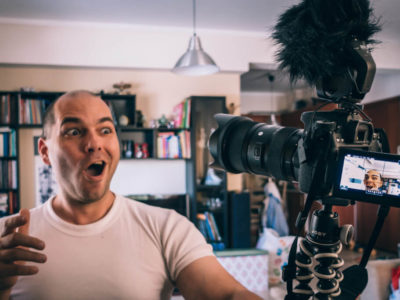Job interviews tend to be anything but pleasant. From the moment you greet your (hopefully) future employer, you can feel them judging you; they note how you present yourself, how you speak, how qualified you seem. All the while, you wish you could read their mind to see what they think of you. What if I told you that, to an extent, you can?
The art of face reading—heralded by many professionals as an entirely legitimate technique—allows complete strangers to identify personality traits in others simply by looking at them. You can’t read your interviewer’s mind, but nothing stops you from using what they think of you to your advantage.
Unlike horoscopes and crystal balls, face reading offers a reliable way to know the unknowable. With over 20 years of face reading experience, Mac Fulfer lives life as successful attorney and author of Amazing Face Reading. Fulfer explained that the technique predates language because early humans needed to separate friend from foe and did so by tapping into their right brain to analyze each other’s facial features. Fulfer went on to say that since human brains are nearly identical, they carry out functions quite similarly. Due to the similarities, our faces show emotions in almost the exact same way.
Face reading has a rich, fascinating background that could fuel a discussion for hours, but millennials crave knowledge specific to advantages in the workforce. Fulfer used this technique to help with jury selection. “[Face reading] gives you a quick, accurate assessment of someone as an individual,” he explained. You can’t slyly give your interviewer a full Myers Briggs personality test, but you can silently make note of their facial features and emotional expressions.

“If you ask someone a question [and] the white starts to show under their eyes, they’re stressed. When there’s more white under the left eye, something personal is the stressor. If it’s the right, the question is to blame,” said Fulfer. When the corners of your interviewer’s mouth turn down after you answer a question, he doubts your sincerity. Did his bottom lip just flatten? He might not trust you or the answer you gave. Does the boss have narrow cheeks? That’s a sign she hates being bogged down by slow people.
Immediately addressing these signs can help you forge a relationship with the person behind the desk. If her lips just went flat, take a minute to clarify your late response. Notice someone with lines extending from their mouth to their chin? Be aware that she may have experienced a deep emotional loss. She may be the most compassionate person in the room.
“When you see something they didn’t verbally tell you, you’re tearing down their walls. You see a person the way they see themselves,” explained Fulfer. Understanding a stranger on an emotional level creates a bond between the two of you, and creating that type of relationship with your interviewer increases your chance of being hired. So no, you’re not reading minds, but you can “put your finger on the pulse of human emotions.”
Recognizing your interviewer’s distinct features and expressions can also help you ask better questions in an interview. If his face suggests he’s generous, ask about how the company gives back to the community. Does he appear driven and competitive? If so, ask specific questions about the company’s expectations of its employees.

Even if you don’t scrutinize your interviewer’s face, she might study yours. Ann Marks, a certified face reader with a background in psychology, learned the technique from Fulfer. She often used face reading with hiring new employees. During her time as an executive, Marks oversaw a great deal of employees and controlled a sizable portion of the company, which she described as people-oriented. After discovering face reading, she incorporated the practice into her interview sessions. “[Face reading] tells you the things you can’t find in a resume,” Marks said.
Awareness about what your own face says about you can even help you determine whether or not you’re in the right career. After Marks began to look more closely at her own face, she saw how much the stress of her career had overwhelmed her. She eventually left her high-powered job to work somewhere more fulfilling. Now, she gives presentations with Fulfer when she’s away from the office.
Jim Kenney, a retired private investigator, also found face reading incredibly useful. Kenney said, “[This technique is] the single most reliable thing as far as determining what [a person’s] personality is.” He felt it allowed him to see people for who they truly were as opposed to how they wished to be perceived. Kenney said face reading can help interviewees communicate more effectively and know when to ask questions versus when to listen. He advised that those interested in sales can especially benefit from this practice. “[Face reading] gets people on your side,” Kenney said.
Though he doesn’t endorse face reading the way Fulfer does, London-based neuroscientist and author of Idiot Brain Dr. Dean Burnett remains aware of how much information our looks actually relay. “People’s faces are very informative about their internal thinking and workings, so as such can be very useful in assessing someone,” Burnett said. “The brain seems to have areas of the visual cortex dedicated to recognising and processing faces.” Burnett also echoed the importance of facial expressions, saying that simple changes like pupil dilation or eye contact can help onlookers gage attraction and deception. So whether you’re skeptical of face reading or not, it does pay to be aware of the constant flow of information from the faces around you.
Face reading won’t guarantee a six-figure salary or even a job, but it can make you a smarter interviewee. For those who want to harness their face reading potential, Mac Fulfer runs certification workshops that require no previous experience. As a byproduct of evolution, everyone can harness the ability to tap into latent face reading skills.
Certified or not, you can benefit from taking the time to look a little more closely at the people around you. Marks recommends that millennials adopt face reading in their personal and professional lives. “In the age of selfies, it’s important to know what your own face says about you. It makes you self aware, and it can stop you from stereotyping others,” she explained. “I used to see people on the street and think ‘Wow, he looks dumb.’ Now I see them and I can tell that they’re nurturing or strong or selfless.”
Whether you’re an aspiring tycoon, an emerging teacher or anything in between, face reading can give you the invisible advantage you need to succeed in any career.

















